2023届高考高三英语二轮复习专题:名词性从句语法疏通课件(共48张PPT)
文档属性
| 名称 | 2023届高考高三英语二轮复习专题:名词性从句语法疏通课件(共48张PPT) |

|
|
| 格式 | pptx | ||
| 文件大小 | 1.8MB | ||
| 资源类型 | 教案 | ||
| 版本资源 | 通用版 | ||
| 科目 | 英语 | ||
| 更新时间 | 2023-05-19 00:00:00 | ||
图片预览

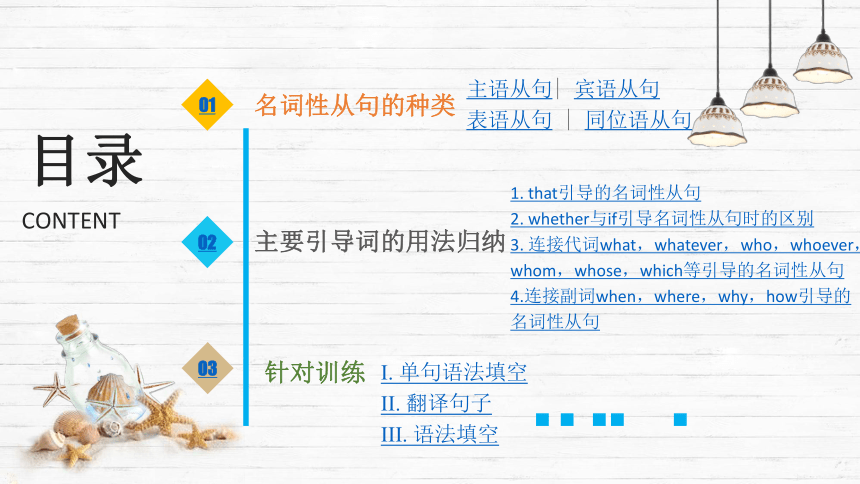
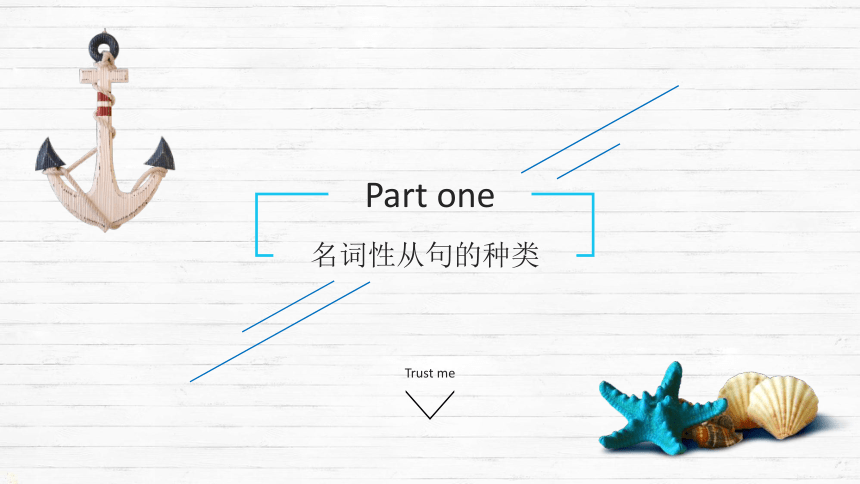
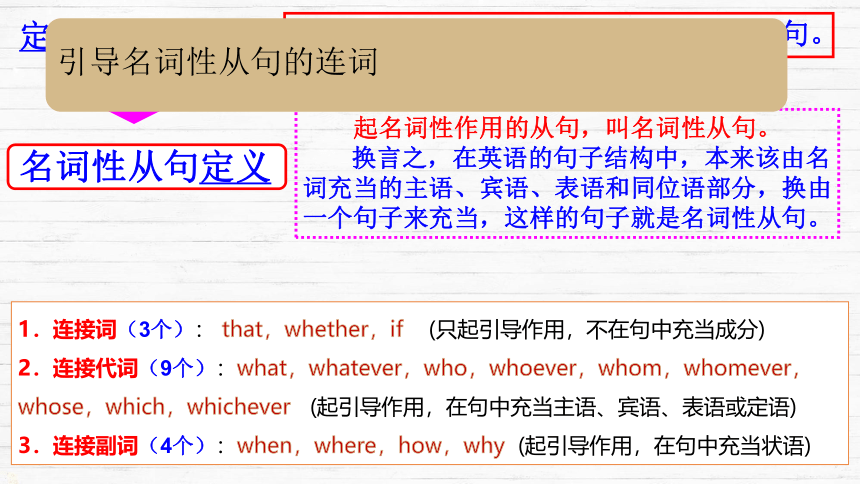
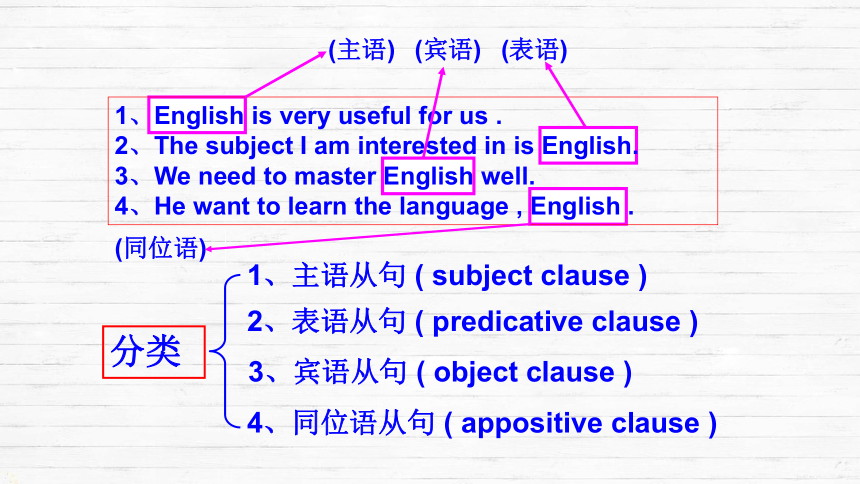

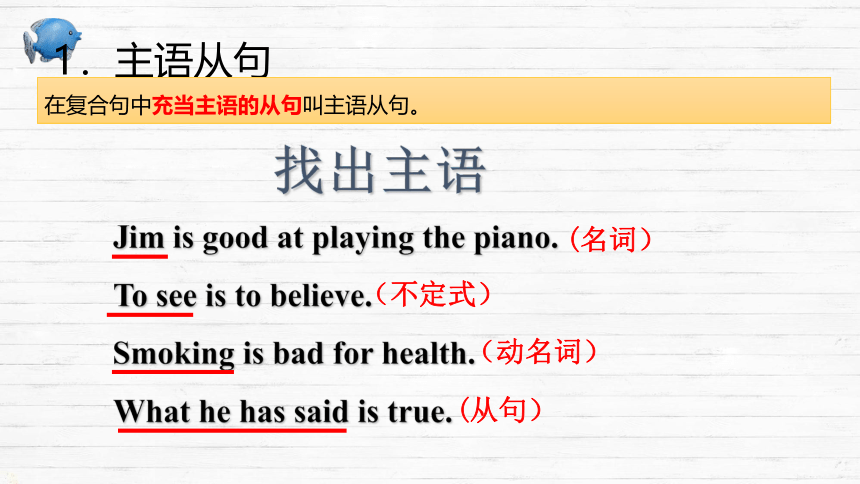
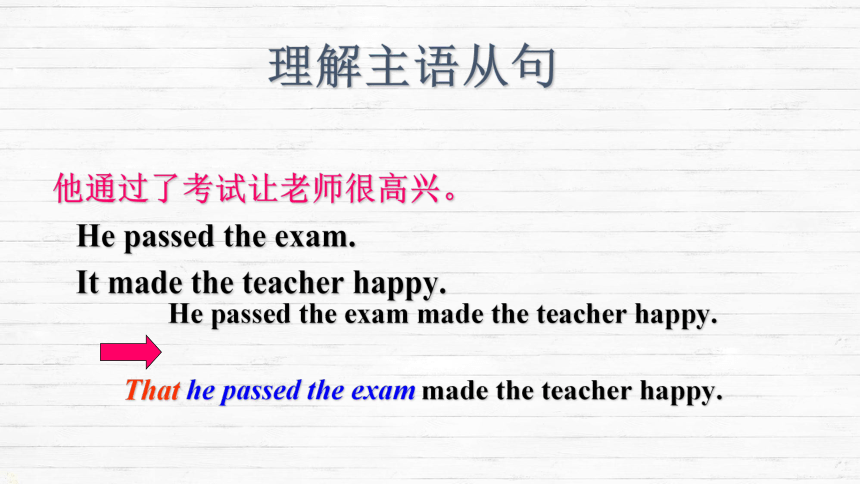
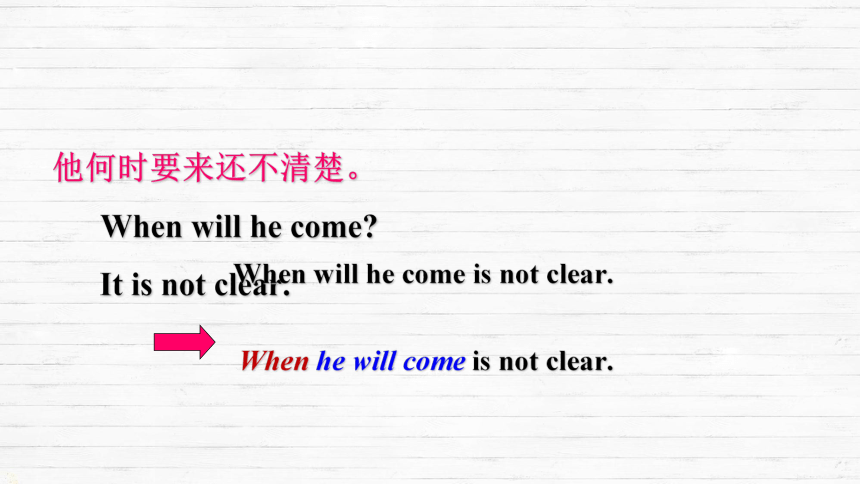


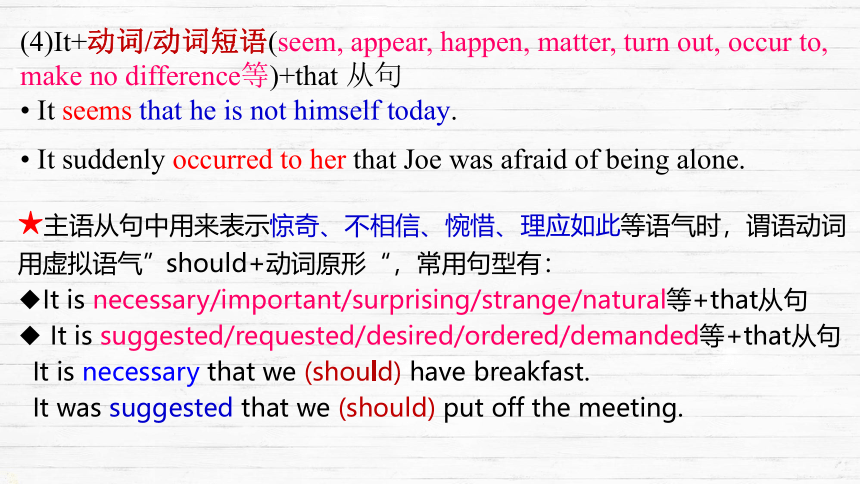
文档简介
(共48张PPT)
名词性从句
语法疏通
目录
CONTENT
01
02
名词性从句的种类
主语从句| 宾语从句
表语从句 | 同位语从句
主要引导词的用法归纳
1. that引导的名词性从句
2. whether与if引导名词性从句时的区别
3. 连接代词what,whatever,who,whoever,whom,whose,which等引导的名词性从句
4.连接副词when,where,why,how引导的名词性从句
I. 单句语法填空
II. 翻译句子
III. 语法填空
03
针对训练
Part one
名词性从句的种类
Trust me
1.连接词(3个): that,whether,if (只起引导作用,不在句中充当成分)
2.连接代词(9个):what,whatever,who,whoever,whom,whomever,whose,which,whichever (起引导作用,在句中充当主语、宾语、表语或定语)
3.连接副词(4个):when,where,how,why (起引导作用,在句中充当状语)
起名词性作用的从句,叫名词性从句。
换言之,在英语的句子结构中,本来该由名词充当的主语、宾语、表语和同位语部分,换由一个句子来充当,这样的句子就是名词性从句。
定语从句的定义:
起定语作用,用来修饰名词或代词的从句。
名词性从句定义
引导名词性从句的连词
4、同位语从句 ( appositive clause )
分类
1、主语从句 ( subject clause )
2、表语从句 ( predicative clause )
3、宾语从句 ( object clause )
1、English is very useful for us .
2、The subject I am interested in is English.
3、We need to master English well.
4、He want to learn the language , English .
(主语)
(宾语)
(表语)
(同位语)
·
That I have a lovely sister is my biggest pride.
My biggest pride is that I have a lovely sister.
--主语从句
--表语从句
No one knows what happened to Malaysian flight 370.
The news that they have divorced is not true.
--宾语从句
--同位语从句
1.主语从句
在复合句中充当主语的从句叫主语从句。
Jim is good at playing the piano.
To see is to believe.
Smoking is bad for health.
What he has said is true.
找出主语
(名词)
(不定式)
(动名词)
(从句)
他通过了考试让老师很高兴。
He passed the exam.
It made the teacher happy.
理解主语从句
He passed the exam made the teacher happy.
That he passed the exam made the teacher happy.
他何时要来还不清楚。
When will he come
It is not clear.
When he will come is not clear.
When will he come is not clear.
It is clear that the two countries can reach an agreement at the conference.
It is well known that the Chinese government has spared no effort to protect people from fake food.
[名师指津] 有时为避免句子头重脚轻,常用it代替主语从句作形式主语放于句首,而把主语从句置于句末。主语从句后的谓语动词一般用单数形式。常用句型如下:
(1)It+be +名词+that从句
(2)It+be +形容词+that从句
(3)It+be+动词的过去分词+that从句
(4)It+不及物动词+that 从句
That you didn't know the rules won't be an excuse for your failure.
Whether we should help up a fallen old person or not remains a heated topic in China.
When the delayed flight will take off depends much on the weather.
用“it”作形式主语的主语从句
(1) It +be+形容词(obvious, true, surprising, wonderful, possible, likely, certain) +that 从句
It is certain that he will win the match.
It isn't likely that I should accept such an offer as that.
(2) It + be +过去分词(said, reported, thought, expected, decided, announced,suggested等)+that从句
It is reported that 20 people were killed in the accident.
(3) It + be +名词词组(a pity, a shame, good news, an honor, no wonder等)+that从句
It is a fact that he cheated in the exam.
(4)It+动词/动词短语(seem, appear, happen, matter, turn out, occur to, make no difference等)+that 从句
It seems that he is not himself today.
It suddenly occurred to her that Joe was afraid of being alone.
★主语从句中用来表示惊奇、不相信、惋惜、理应如此等语气时,谓语动词用虚拟语气”should+动词原形“,常用句型有:
◆It is necessary/important/surprising/strange/natural等+that从句
◆ It is suggested/requested/desired/ordered/demanded等+that从句
It is necessary that we (should) have breakfast.
It was suggested that we (should) put off the meeting.
使用主语从句的注意事项
When will he come is not known.
When he will come is not known.
规律一: 主语从句一律用陈述语序,
即主语在前,谓语在后。
He will not come to the meeting this evening is true.
正:That he will not come to the meeting this evening is true.
规律二: 连词that 在从句中无实际意义,但不能省略。
When he was born are a puzzle.
正:When he was born is a puzzle.
规律三:主语从句的谓语动词多用
单数第三人称形式。
When they will start and where they will go_____(be)still unknown.
are
2.宾语从句
在复合句中作宾语的名词性从句叫宾语从句,位于及物动词(短语)、介词或形容词之后。
We must never think (that) we are good in everything while others are good in nothing.
Everything depends on whether we have enough money.
She will give whoever needs help a warm support.
[名师指津] 在可以接复合宾语的动词之后,如think,make,consider等,可以用it作形式宾语。
He has made it clear that he will not give in.
3.表语从句
在复合句中作表语的从句叫表语从句。引导表语从句的关联词与引导主语从句的关联词大致一样,表语从句位于连系动词后,有时用as if,because等引导。其基本结构为:主语+系动词+从句。
The fact is that we have lost the game.
That is why he didn't come to the meeting.
It looks as if it is going to rain.
[名师指津] 当主语是reason时,表语从句要用that引导而不是because。
The reason why he was late was that he missed the train by one minute this morning.
4.同位语从句
同位语从句说明其前面的名词的具体内容。同位语从句通常由that引导,也可由其他连接代词或连接副词引导,可用于同位语从句的名词有:advice,demand,doubt,fact,hope,idea,information,message,news,order,problem,promise,question,request,suggestion,truth,wish,word等。
The news that we won the game excited all of us.
I have no idea when he will come back home.
[名师指津] 同位语从句和定语从句的区别:
(1)意义不同:同位语从句是跟在一个抽象名词之后,对该名词的具体内容作进一步解释说明;而定语从句在复合句中作定语,对前面名词进行修饰、限制。
(2)连接词用法不同:that作为关系代词,可以引导定语从句,充当句子成分,在从句中作宾语时可以省略; that引导同位语从句时,只起连词的作用,没有实际意义,不充当句子成分,一般不能省略。 试比较:
I had no idea that you were here. (that引导同位语从句,不能省略)
Have you got the idea (that) this book gives you of life in ancient Greece?(that引导定语从句,作宾语,可以省略)
Part two
名词性从句主要引导词的用法归纳
Trust me
连接副词(4个):when、 why、where、 how
引导词
从属连词(3个):that 、if、 whether
连接代词 (9个):who、 whom 、 what、 which、 whose、 whoever whomever、 whatever、 whichever、
名词性从句引导词的用法(1):
从句中的每一个引导词都有3个功能,分别如下:
从属连词
“that”---无词义、不作成份、起连接作用
“if”--- “是否”、不作成份、起连接作用
“whether”---“是否”、不作成份、起连接作用
1.that引导的名词性从句
It is obvious to the students that they should get well prepared for their future. (主语从句,it作形式主语)
Experts believe (that) people can waste less food by shopping only when it is necessary. (宾语从句)
My decision is that all of us are to start at 6 o'clock tomorrow morning.
(表语从句)
I made a promise to myself that this year,my first year in high school,would be different. (同位语从句)
连词that在引导名词性从句时本身没有意义,在从句中不担任任何句子成分,但引导主语从句、表语从句、同位语从句时不能省略。在宾语从句中有时可以省略。
1、That we will realize our dreams in the future is certain .
2、The fact is that Beijing will hold 29th Olympic Games this year.
3、I know that well begun is half done .
4、He heard the news that Liuxiang set a new world record .
“that” 无词义、不作成份、起连接作用
(主语从句)
(表语从句)
(宾语从句)
(同位语从句)
1、My idea is that we should do it right now.
2、She won’t believe that he has become a thief.
3、That he is a famous singer is known to us.
4、I knew the news that our team won the match.
宾语从句
表语从句
主语从句
宾语从句
2.whether与if引导名词性从句时的区别
在主语从句、表语从句、同位语从句中只能用whether,不能用if。
01
Whether the meeting will be put off has not been decided yet.
The trouble is whether he can come on time.
在宾语从句中whether和if一般可以互换,但:
02
It all depends on whether he will recover.
(1)作介词宾语时连接词一般用whether。
I don't know whether he will take part in the meeting or not.
(2)后面直接跟or not时用whether。
1、Whether she will come back on time depends on weather .
2、The problem is whether you could give us some valuable advice .
3、I asked him whether he could do me a favor .
4、Could you tell me the question whether English is useful for us now.
“whether” “是否”、不作成份、起连接作用
(主语从句)
(表语从句)
(宾语从句)
(同位语从句)
1、If不能引导放于句首的主语从句,而whether可以。
2、引导表语从句用whether,不用if。
3、引导同位语从句用whether,不用if。
4、whether可以引导从句作介词的宾语,不用if 。
5、whether or not 连在一起可以,但if不可以。
If与whether的区别:
连接代词
名词性从句引导词的用法(2):
“who”---“谁”、作主语、起连接作用
“whom”---“谁”、作宾语、起连接作用
“what”---“事情”、作主表宾、起连接作用
“whose”---“谁的”、作定语、起连接作用
“which”---“哪----”、作定语、起连接作用
“who”---“谁”、作主语、起连接作用
1、Who will go to the college is still uncertain .
2、The trouble is who could lend me some money .
3、He want to know who picked up his mobile phone .
(主语从句)
(表语从句)
(宾语从句)
1、Whom you will learn from is worth thinking over .
2、The thing I am anxious about is whom he will turn to for help .
3、His mother asked him whom he could believe in .
“whom”---“谁”、作宾语、起连接作用
(主语从句)
(表语从句)
(宾语从句)
1、What I desire to get is a good reputation .
2、What he will tell me is what I have been expecting to know .
3、They agree with what I said just now .
“what”---“事情”、作主表宾语、起连接作用
(主语从句)
(表语从句)
(宾语从句)
1、Which class is suitable for us isn’t most important .
2、What he wants to ask you now is which team won the game .
3、Could you tell me which one is right .
“which”---“哪---”、作定语、起连接作用
(主语从句)
(表语从句)
(宾语从句)
1、Whose bag was the most beautiful is still unknown now .
2、The question is whose friends could lend me a hand .
3、I want to know whose suggestion is more practical .
“whose”---“谁的”、作定语、起连接作用
(主语从句)
(表语从句)
(宾语从句)
名词性从句引导词的用法(3):
连接代词
“whomever”-- “-----的任何人”、作宾语、
“whoever”-- “-----的任何人”、作主语、
“whatever”-- “----的任何东西”、作主表宾语、
“whichever”--- “无论哪个或哪些---”、作定语、
“whoever”-- “---的任何人”、作主语、起连接作用
1、Whoever could solve the problem will be rewarded .
2、The person I will praise is whoever could work out the question .
3、You should appreciate whoever helped you in the past .
(主语从句)
(表语从句)
(宾语从句)
“whomever”--- “---的任何人”、作宾语、起连接作用
1、Whomever you will meet in the meeting is excellent .
2、The person I could depend on is whomever you believe in .
3、You should learn from whomever I praised yesterday .
(主语从句)
(表语从句)
(宾语从句)
1、Whatever you did in the past was very meaningful .
2、What we should do is whatever is worth doing .
3、We should do whatever is worth doing .
“whatever”-- “--的任何东西”、作主表宾语、
(主语从句)
(表语从句)
(宾语从句)
“whichever”-- “--的哪些或哪个”、作主、表、宾语、
1、Whichever team win the game is possible .
2、The fact is whichever teacher could help you
learn English well .
3、You could choose whichever book you want .
(主语从句)
(表语从句)
(宾语从句)
名词性从句引导词的用法(4):
连接副词
“why”---- “为什么”、作状语、起连接作用
“how”----- “如何”、作状语、起连接作用
“where”-- “什么地方”、作状语、起连接作用
“when”-- “什么时候”、作状语、起连接作用
“when”-- “什么时候”、作状语、起连接作用
1、When the meeting will begin isn’t decided now .
2、The trouble is when he could recover from the disease .
3、He asked us when we would graduate from the school .
(主语从句)
(表语从句)
(宾语从句)
“where”-- “什么地方”、作状语、起连接作用
1、Where I could buy the book is uncertain now .
2、His question was where we would hold the opening ceremony .
3、I couldn’t tell you where they have been living .
(主语从句)
(表语从句)
(宾语从句)
1、Why he killed himself is still a secret now .
2、What surprised me was why they failed again .
3、I just want to ask you why I was fired .
“why”-- “为什么”、作状语、起连接作用
(主语从句)
(表语从句)
(宾语从句)
1、How the thief stole the bike is still a mystery .
2、What the professor asked us was how we could make our parents happy .
3、I will go to ask my teacher how I could work out the problem .
“how”---- “如何”、作状语、起连接作用
(主语从句)
(表语从句)
(宾语从句)
Part three
针对训练
Trust me
1.单句语法填空
1. I’m not sure ________ is more frightened,me or the female gorilla(大猩猩) that suddenly appears out of nowhere.(2018·全国卷Ⅲ)
2.She asked me ____________________ I had returned the books to the library, and I admitted that I hadn't.(2017·天津卷)
3.Every year, ____________________ makes the most beautiful kite will win a prize in the Kite Festival.(2017·北京卷)
4.Jane moved aimlessly down the tree-lined street, not knowing __________________ she was heading.(2017·北京卷)
5.We choose this hotel because the price for a night here is down to $20,half of ____________________ it used to charge.(2017·江苏卷)
whether
whoever
where
what
who
6.As natural architects, the Pueblo Indians figured out exactly ____________________ thick the adobe walls needed to be to make the cycle work on most days.(全国卷Ⅱ)
7.A typical Chinese wedding nowadays goes like this:when a new couple is engaged,____________ follows is a choice of the date of their marriage.(2020·湖南浏阳六校联考)
8.After being designated as the first special economic zone in China,____________ was once a fishing village has rapidly become an emerging modern city.(2020·河南洛阳期中考试)
9.The ideal nap depends on ____________ you want from that nap.(2020·吉林省吉林市一次调研)
how
what
what
what
10.Finally,a woman with a tray full of food sat down opposite him and informed him _______________ the cafeteria worked.(2019·莆田模拟)
11.I wonder first of all what they want,and then wonder _______________ they are so eager to accept advice themselves.(2019·湖南师大附中模拟)
12.Remember that true power does not necessarily control over situations,but the ability to deal with _______________ comes your way.(2019·南昌模拟)
13.They never get angry and are always kind to the students. That’s ____________ the children can always get on well with their robot teachers.
14. We don’t respect _____________ we think is better than us; we don’t respect poor and old people,or we don’t respect who we feel is less better than us.(2019·南昌模拟)
how
if/whether
whatever
why
who
2.翻译句子
1.已经定下来了,会议推迟到了下周一。(主语从句)
2.我并不知道他是否参加音乐会。(宾语从句)
3.问题是值不值得试一试。(表语从句)
4.他们赢得比赛的消息很快就传遍了整个学校。(同位语从句)
5.他没来公司的原因是他生病了。(表语从句)
It is decided that the meeting has been put off till next Monday.
I didn't know whether/if he would attend the concert.
The question is whether it is worth trying.
The news that they had won the game soon spread over the whole school.
The reason why he didn't come to the company was that he was ill.
3.语法填空
(2020·黄冈中学模拟)Canadians and Americans eat somewhat differently. Some Canadians use tableware as Americans do,while some like the tableware of the British Isles,Ireland and the Commonwealth of Nations; but most Canadians use a 1. (combine) of the two styles.
Canadians tend 2. (use) the simpler British,Irish and Commonwealth style when cutting food. The right hand cuts with a knife,while the left holds 3. is being cut with a fork. Then the left hand,use 4.________ fork to lift the cut food directly into the mouth.
combination
to use
what
the
In contrast,most Americans will exchange the knife and fork before 5.________(lift) cut food to their mouths,which is 6.________ (true) embarrassing.In the most cases,Americans use forks 7.________ (hold) in their right hands to bring all food to their mouths,whether or not it needs to be cut.Most Canadians use the American style 8.________ food that does not need to be cut.
Each of these styles 9. (be) acceptable in both countries.However,you will be less 10. (attract) by using the American style in the United States,as most Americans are not as used to different cultures as Canadians are.
lifting
truly
held
for
is
attractive
感谢您的欣赏!
名词性从句
语法疏通
目录
CONTENT
01
02
名词性从句的种类
主语从句| 宾语从句
表语从句 | 同位语从句
主要引导词的用法归纳
1. that引导的名词性从句
2. whether与if引导名词性从句时的区别
3. 连接代词what,whatever,who,whoever,whom,whose,which等引导的名词性从句
4.连接副词when,where,why,how引导的名词性从句
I. 单句语法填空
II. 翻译句子
III. 语法填空
03
针对训练
Part one
名词性从句的种类
Trust me
1.连接词(3个): that,whether,if (只起引导作用,不在句中充当成分)
2.连接代词(9个):what,whatever,who,whoever,whom,whomever,whose,which,whichever (起引导作用,在句中充当主语、宾语、表语或定语)
3.连接副词(4个):when,where,how,why (起引导作用,在句中充当状语)
起名词性作用的从句,叫名词性从句。
换言之,在英语的句子结构中,本来该由名词充当的主语、宾语、表语和同位语部分,换由一个句子来充当,这样的句子就是名词性从句。
定语从句的定义:
起定语作用,用来修饰名词或代词的从句。
名词性从句定义
引导名词性从句的连词
4、同位语从句 ( appositive clause )
分类
1、主语从句 ( subject clause )
2、表语从句 ( predicative clause )
3、宾语从句 ( object clause )
1、English is very useful for us .
2、The subject I am interested in is English.
3、We need to master English well.
4、He want to learn the language , English .
(主语)
(宾语)
(表语)
(同位语)
·
That I have a lovely sister is my biggest pride.
My biggest pride is that I have a lovely sister.
--主语从句
--表语从句
No one knows what happened to Malaysian flight 370.
The news that they have divorced is not true.
--宾语从句
--同位语从句
1.主语从句
在复合句中充当主语的从句叫主语从句。
Jim is good at playing the piano.
To see is to believe.
Smoking is bad for health.
What he has said is true.
找出主语
(名词)
(不定式)
(动名词)
(从句)
他通过了考试让老师很高兴。
He passed the exam.
It made the teacher happy.
理解主语从句
He passed the exam made the teacher happy.
That he passed the exam made the teacher happy.
他何时要来还不清楚。
When will he come
It is not clear.
When he will come is not clear.
When will he come is not clear.
It is clear that the two countries can reach an agreement at the conference.
It is well known that the Chinese government has spared no effort to protect people from fake food.
[名师指津] 有时为避免句子头重脚轻,常用it代替主语从句作形式主语放于句首,而把主语从句置于句末。主语从句后的谓语动词一般用单数形式。常用句型如下:
(1)It+be +名词+that从句
(2)It+be +形容词+that从句
(3)It+be+动词的过去分词+that从句
(4)It+不及物动词+that 从句
That you didn't know the rules won't be an excuse for your failure.
Whether we should help up a fallen old person or not remains a heated topic in China.
When the delayed flight will take off depends much on the weather.
用“it”作形式主语的主语从句
(1) It +be+形容词(obvious, true, surprising, wonderful, possible, likely, certain) +that 从句
It is certain that he will win the match.
It isn't likely that I should accept such an offer as that.
(2) It + be +过去分词(said, reported, thought, expected, decided, announced,suggested等)+that从句
It is reported that 20 people were killed in the accident.
(3) It + be +名词词组(a pity, a shame, good news, an honor, no wonder等)+that从句
It is a fact that he cheated in the exam.
(4)It+动词/动词短语(seem, appear, happen, matter, turn out, occur to, make no difference等)+that 从句
It seems that he is not himself today.
It suddenly occurred to her that Joe was afraid of being alone.
★主语从句中用来表示惊奇、不相信、惋惜、理应如此等语气时,谓语动词用虚拟语气”should+动词原形“,常用句型有:
◆It is necessary/important/surprising/strange/natural等+that从句
◆ It is suggested/requested/desired/ordered/demanded等+that从句
It is necessary that we (should) have breakfast.
It was suggested that we (should) put off the meeting.
使用主语从句的注意事项
When will he come is not known.
When he will come is not known.
规律一: 主语从句一律用陈述语序,
即主语在前,谓语在后。
He will not come to the meeting this evening is true.
正:That he will not come to the meeting this evening is true.
规律二: 连词that 在从句中无实际意义,但不能省略。
When he was born are a puzzle.
正:When he was born is a puzzle.
规律三:主语从句的谓语动词多用
单数第三人称形式。
When they will start and where they will go_____(be)still unknown.
are
2.宾语从句
在复合句中作宾语的名词性从句叫宾语从句,位于及物动词(短语)、介词或形容词之后。
We must never think (that) we are good in everything while others are good in nothing.
Everything depends on whether we have enough money.
She will give whoever needs help a warm support.
[名师指津] 在可以接复合宾语的动词之后,如think,make,consider等,可以用it作形式宾语。
He has made it clear that he will not give in.
3.表语从句
在复合句中作表语的从句叫表语从句。引导表语从句的关联词与引导主语从句的关联词大致一样,表语从句位于连系动词后,有时用as if,because等引导。其基本结构为:主语+系动词+从句。
The fact is that we have lost the game.
That is why he didn't come to the meeting.
It looks as if it is going to rain.
[名师指津] 当主语是reason时,表语从句要用that引导而不是because。
The reason why he was late was that he missed the train by one minute this morning.
4.同位语从句
同位语从句说明其前面的名词的具体内容。同位语从句通常由that引导,也可由其他连接代词或连接副词引导,可用于同位语从句的名词有:advice,demand,doubt,fact,hope,idea,information,message,news,order,problem,promise,question,request,suggestion,truth,wish,word等。
The news that we won the game excited all of us.
I have no idea when he will come back home.
[名师指津] 同位语从句和定语从句的区别:
(1)意义不同:同位语从句是跟在一个抽象名词之后,对该名词的具体内容作进一步解释说明;而定语从句在复合句中作定语,对前面名词进行修饰、限制。
(2)连接词用法不同:that作为关系代词,可以引导定语从句,充当句子成分,在从句中作宾语时可以省略; that引导同位语从句时,只起连词的作用,没有实际意义,不充当句子成分,一般不能省略。 试比较:
I had no idea that you were here. (that引导同位语从句,不能省略)
Have you got the idea (that) this book gives you of life in ancient Greece?(that引导定语从句,作宾语,可以省略)
Part two
名词性从句主要引导词的用法归纳
Trust me
连接副词(4个):when、 why、where、 how
引导词
从属连词(3个):that 、if、 whether
连接代词 (9个):who、 whom 、 what、 which、 whose、 whoever whomever、 whatever、 whichever、
名词性从句引导词的用法(1):
从句中的每一个引导词都有3个功能,分别如下:
从属连词
“that”---无词义、不作成份、起连接作用
“if”--- “是否”、不作成份、起连接作用
“whether”---“是否”、不作成份、起连接作用
1.that引导的名词性从句
It is obvious to the students that they should get well prepared for their future. (主语从句,it作形式主语)
Experts believe (that) people can waste less food by shopping only when it is necessary. (宾语从句)
My decision is that all of us are to start at 6 o'clock tomorrow morning.
(表语从句)
I made a promise to myself that this year,my first year in high school,would be different. (同位语从句)
连词that在引导名词性从句时本身没有意义,在从句中不担任任何句子成分,但引导主语从句、表语从句、同位语从句时不能省略。在宾语从句中有时可以省略。
1、That we will realize our dreams in the future is certain .
2、The fact is that Beijing will hold 29th Olympic Games this year.
3、I know that well begun is half done .
4、He heard the news that Liuxiang set a new world record .
“that” 无词义、不作成份、起连接作用
(主语从句)
(表语从句)
(宾语从句)
(同位语从句)
1、My idea is that we should do it right now.
2、She won’t believe that he has become a thief.
3、That he is a famous singer is known to us.
4、I knew the news that our team won the match.
宾语从句
表语从句
主语从句
宾语从句
2.whether与if引导名词性从句时的区别
在主语从句、表语从句、同位语从句中只能用whether,不能用if。
01
Whether the meeting will be put off has not been decided yet.
The trouble is whether he can come on time.
在宾语从句中whether和if一般可以互换,但:
02
It all depends on whether he will recover.
(1)作介词宾语时连接词一般用whether。
I don't know whether he will take part in the meeting or not.
(2)后面直接跟or not时用whether。
1、Whether she will come back on time depends on weather .
2、The problem is whether you could give us some valuable advice .
3、I asked him whether he could do me a favor .
4、Could you tell me the question whether English is useful for us now.
“whether” “是否”、不作成份、起连接作用
(主语从句)
(表语从句)
(宾语从句)
(同位语从句)
1、If不能引导放于句首的主语从句,而whether可以。
2、引导表语从句用whether,不用if。
3、引导同位语从句用whether,不用if。
4、whether可以引导从句作介词的宾语,不用if 。
5、whether or not 连在一起可以,但if不可以。
If与whether的区别:
连接代词
名词性从句引导词的用法(2):
“who”---“谁”、作主语、起连接作用
“whom”---“谁”、作宾语、起连接作用
“what”---“事情”、作主表宾、起连接作用
“whose”---“谁的”、作定语、起连接作用
“which”---“哪----”、作定语、起连接作用
“who”---“谁”、作主语、起连接作用
1、Who will go to the college is still uncertain .
2、The trouble is who could lend me some money .
3、He want to know who picked up his mobile phone .
(主语从句)
(表语从句)
(宾语从句)
1、Whom you will learn from is worth thinking over .
2、The thing I am anxious about is whom he will turn to for help .
3、His mother asked him whom he could believe in .
“whom”---“谁”、作宾语、起连接作用
(主语从句)
(表语从句)
(宾语从句)
1、What I desire to get is a good reputation .
2、What he will tell me is what I have been expecting to know .
3、They agree with what I said just now .
“what”---“事情”、作主表宾语、起连接作用
(主语从句)
(表语从句)
(宾语从句)
1、Which class is suitable for us isn’t most important .
2、What he wants to ask you now is which team won the game .
3、Could you tell me which one is right .
“which”---“哪---”、作定语、起连接作用
(主语从句)
(表语从句)
(宾语从句)
1、Whose bag was the most beautiful is still unknown now .
2、The question is whose friends could lend me a hand .
3、I want to know whose suggestion is more practical .
“whose”---“谁的”、作定语、起连接作用
(主语从句)
(表语从句)
(宾语从句)
名词性从句引导词的用法(3):
连接代词
“whomever”-- “-----的任何人”、作宾语、
“whoever”-- “-----的任何人”、作主语、
“whatever”-- “----的任何东西”、作主表宾语、
“whichever”--- “无论哪个或哪些---”、作定语、
“whoever”-- “---的任何人”、作主语、起连接作用
1、Whoever could solve the problem will be rewarded .
2、The person I will praise is whoever could work out the question .
3、You should appreciate whoever helped you in the past .
(主语从句)
(表语从句)
(宾语从句)
“whomever”--- “---的任何人”、作宾语、起连接作用
1、Whomever you will meet in the meeting is excellent .
2、The person I could depend on is whomever you believe in .
3、You should learn from whomever I praised yesterday .
(主语从句)
(表语从句)
(宾语从句)
1、Whatever you did in the past was very meaningful .
2、What we should do is whatever is worth doing .
3、We should do whatever is worth doing .
“whatever”-- “--的任何东西”、作主表宾语、
(主语从句)
(表语从句)
(宾语从句)
“whichever”-- “--的哪些或哪个”、作主、表、宾语、
1、Whichever team win the game is possible .
2、The fact is whichever teacher could help you
learn English well .
3、You could choose whichever book you want .
(主语从句)
(表语从句)
(宾语从句)
名词性从句引导词的用法(4):
连接副词
“why”---- “为什么”、作状语、起连接作用
“how”----- “如何”、作状语、起连接作用
“where”-- “什么地方”、作状语、起连接作用
“when”-- “什么时候”、作状语、起连接作用
“when”-- “什么时候”、作状语、起连接作用
1、When the meeting will begin isn’t decided now .
2、The trouble is when he could recover from the disease .
3、He asked us when we would graduate from the school .
(主语从句)
(表语从句)
(宾语从句)
“where”-- “什么地方”、作状语、起连接作用
1、Where I could buy the book is uncertain now .
2、His question was where we would hold the opening ceremony .
3、I couldn’t tell you where they have been living .
(主语从句)
(表语从句)
(宾语从句)
1、Why he killed himself is still a secret now .
2、What surprised me was why they failed again .
3、I just want to ask you why I was fired .
“why”-- “为什么”、作状语、起连接作用
(主语从句)
(表语从句)
(宾语从句)
1、How the thief stole the bike is still a mystery .
2、What the professor asked us was how we could make our parents happy .
3、I will go to ask my teacher how I could work out the problem .
“how”---- “如何”、作状语、起连接作用
(主语从句)
(表语从句)
(宾语从句)
Part three
针对训练
Trust me
1.单句语法填空
1. I’m not sure ________ is more frightened,me or the female gorilla(大猩猩) that suddenly appears out of nowhere.(2018·全国卷Ⅲ)
2.She asked me ____________________ I had returned the books to the library, and I admitted that I hadn't.(2017·天津卷)
3.Every year, ____________________ makes the most beautiful kite will win a prize in the Kite Festival.(2017·北京卷)
4.Jane moved aimlessly down the tree-lined street, not knowing __________________ she was heading.(2017·北京卷)
5.We choose this hotel because the price for a night here is down to $20,half of ____________________ it used to charge.(2017·江苏卷)
whether
whoever
where
what
who
6.As natural architects, the Pueblo Indians figured out exactly ____________________ thick the adobe walls needed to be to make the cycle work on most days.(全国卷Ⅱ)
7.A typical Chinese wedding nowadays goes like this:when a new couple is engaged,____________ follows is a choice of the date of their marriage.(2020·湖南浏阳六校联考)
8.After being designated as the first special economic zone in China,____________ was once a fishing village has rapidly become an emerging modern city.(2020·河南洛阳期中考试)
9.The ideal nap depends on ____________ you want from that nap.(2020·吉林省吉林市一次调研)
how
what
what
what
10.Finally,a woman with a tray full of food sat down opposite him and informed him _______________ the cafeteria worked.(2019·莆田模拟)
11.I wonder first of all what they want,and then wonder _______________ they are so eager to accept advice themselves.(2019·湖南师大附中模拟)
12.Remember that true power does not necessarily control over situations,but the ability to deal with _______________ comes your way.(2019·南昌模拟)
13.They never get angry and are always kind to the students. That’s ____________ the children can always get on well with their robot teachers.
14. We don’t respect _____________ we think is better than us; we don’t respect poor and old people,or we don’t respect who we feel is less better than us.(2019·南昌模拟)
how
if/whether
whatever
why
who
2.翻译句子
1.已经定下来了,会议推迟到了下周一。(主语从句)
2.我并不知道他是否参加音乐会。(宾语从句)
3.问题是值不值得试一试。(表语从句)
4.他们赢得比赛的消息很快就传遍了整个学校。(同位语从句)
5.他没来公司的原因是他生病了。(表语从句)
It is decided that the meeting has been put off till next Monday.
I didn't know whether/if he would attend the concert.
The question is whether it is worth trying.
The news that they had won the game soon spread over the whole school.
The reason why he didn't come to the company was that he was ill.
3.语法填空
(2020·黄冈中学模拟)Canadians and Americans eat somewhat differently. Some Canadians use tableware as Americans do,while some like the tableware of the British Isles,Ireland and the Commonwealth of Nations; but most Canadians use a 1. (combine) of the two styles.
Canadians tend 2. (use) the simpler British,Irish and Commonwealth style when cutting food. The right hand cuts with a knife,while the left holds 3. is being cut with a fork. Then the left hand,use 4.________ fork to lift the cut food directly into the mouth.
combination
to use
what
the
In contrast,most Americans will exchange the knife and fork before 5.________(lift) cut food to their mouths,which is 6.________ (true) embarrassing.In the most cases,Americans use forks 7.________ (hold) in their right hands to bring all food to their mouths,whether or not it needs to be cut.Most Canadians use the American style 8.________ food that does not need to be cut.
Each of these styles 9. (be) acceptable in both countries.However,you will be less 10. (attract) by using the American style in the United States,as most Americans are not as used to different cultures as Canadians are.
lifting
truly
held
for
is
attractive
感谢您的欣赏!
